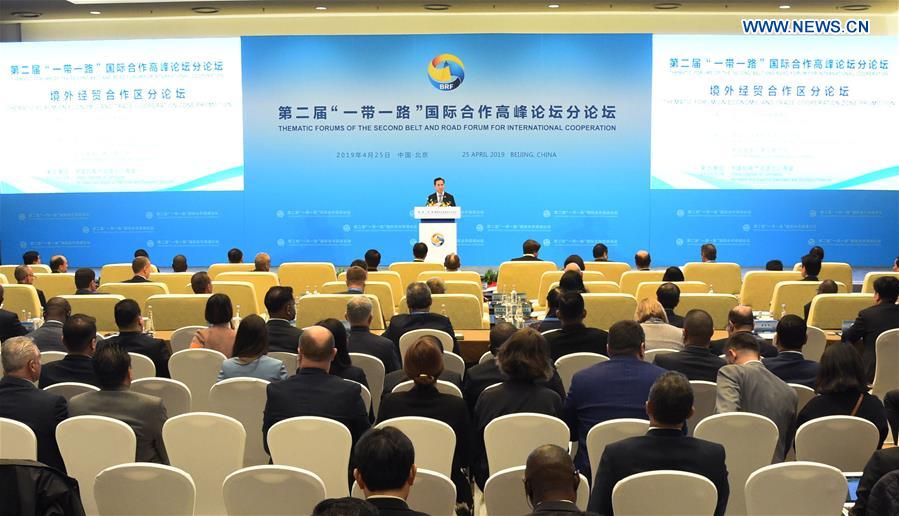Economic zones expected to play bigger role in global BRI cooperation
 0 Comment(s)
0 Comment(s) Print
Print E-mail Xinhua, April 26, 2019
E-mail Xinhua, April 26, 2019

From Cambodia to Ethiopia to Georgia, economic and industrial zones have become an increasingly important dimension of international cooperation within the framework of the Belt and Road Initiative (BRI).
Speaking at a sub-forum on Thursday at the ongoing second Belt and Road Forum for International Cooperation (BRF), senior officials from around the world called for closer BRI cooperation to make better use of such special zones and create more win-win results.
Georgian Vice Prime Minister Maya Tskitishvili said her country established a free industrial zone for global businesses and inked a free trade agreement with both China and the European Union (EU).
"Georgia is an emerging market looking to play a greater role in the global economy," said Tskitishvili, who is also Georgia's minister of regional development and infrastructure.
Calling the BRI a "vital instrument" in bringing the world closer together, she said Chinese investment in the country's economic zones will contribute to advancing Georgia's economy and raising its people's living standards.
Saudi Arabia's Minister of Energy, Industry and Mineral Resources, Khalid A. Al-Falih, said China and his country share "bonds between the two ends of Asia" that go back centuries.
Saudi Arabia, he added, is developing special economic zones to attract domestic and foreign investment that would be suitable candidates to merge with the BRI.
More Chinese involvement in Saudi Arabia would "bring greater prosperity to our peoples," he said.
To Ethiopian Minister of Finance Ahmed Shide, "cooperation zones are very important for industrialization," as they enhance "ease of doing business" and can serve as "a good experiment in industrialization."
Shide said the BRI complements the Horn of Africa nation's own development initiatives that involve interstate highways, railways, dry ports and special economic zones. "China has actively supported our endeavors," added the minister.
In Southeast Asia, one of the fastest growing regions in the world, countries are also seeking to boost win-win cooperation in developing economic zones within the BRI framework.
Nguyen Chi Dung, Vietnam's minister of planning and investment, said the BRI is an opportunity to acquire knowledge and new management methods.
Although Chinese companies already have a presence in several of the country's industrial parks, Vietnam plans to create new economic zones and welcomes Chinese and other foreign enterprises to invest, added the minister.
Secretary General of the Thailand Board of Investment Duangjai Asawachintachit told the sub-forum that her country is looking to move out of the middle-income trap and is "working to improve its business ecosystem."
One way of doing so is through the Eastern Economic Corridor (EEC), Thailand's new development frontier, which the Thai government aims to build into a leading economic zone through strong land, sea and air linkages with Southeast Asia, she said.
Thailand, she added, welcomes Chinese companies with a focus on high technology to set up shop in the EEC and other economic zones.
Calling for more BRI cooperation with China, Secretary General of the Council for the Development of Cambodia Sok Chenda Sophea said advantages of its industrial parks for Chinese companies include Cambodia's strategic location in the Mekong region and its young population compared to other Asian nations.
Vivencio Dizon, president and chief executive officer of the Bases Conversion and Development Authority of the Philippines, said he has visited several parks in China and thinks that China "shows the way to the rest of the world on how to run parks."
The BRI is "critical to move our countries forward" in Southeast Asia, he said, adding that it is also "a strategic initiative amid the uncertainties facing the world."





